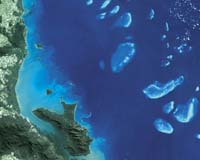| . |  |
. |
Dhaka (AFP) April 12, 2010 Environmental campaigners branded a move Monday by Bangladesh to ease strict controls on its vital shipbreaking industry as "suicidal", saying it would expose tens of thousands to toxic waste. The government amended a law late Sunday to permit the industry, the world's largest, to bring in ships using their own declarations that the vessels are free from toxic materials, the shipping department said. Under a government order in January, ships heading for Bangladeshi breaking yards were required to be certified by the selling nation's environmental authorities. But the tougher rules hit the industry, which is a major earner in the impoverished nation. "The previous order has badly affected the shipbreaking industry, which is a vital sector for the economy. We amended it to make sure the industry can keep on growing," said Bazlur Rahman, shipping department head. The change will help scores of scrapyards in the southeastern coastal town of Sitakundu, which last year accounted for 30 percent of the vessels dismantled worldwide, said London-based broker Clarkson Research. Shipbreakers stopped work for nearly a month because none of the ships could get certificates after the government tightened the environmental rules but rights groups hailed it as their "biggest achievement". More than 20 ships were stuck at the Chittagong Port, according to the customs department, which refused to clear the vessels imported without toxic-free certificates from environmental agencies. Domestic iron prices shot up by 20 percent as the construction industry is heavily dependent on steel recycled from vessels. Environmentalists blasted the government's flip-flop, saying it would lead to the pollution of Bangladesh's coastline and expose tens of thousands of workers to deadly waste such as asbestos. Mohammad Ali Shaheen, the head of the NGO Platform on Shipbreaking, called the order "suicidal" and underlined the weakness of the authorities and lack of commitment to uphold labour and environmental standards. "It gives shipbreakers a free hand to import ships that contain deadly toxic waste like asbestos, mercury and PCPs. Once again, the government has kow-towed to rogue traders," he said. Last year, 26 people were killed at the scrap yards, a figure that charities call a huge underestimate as it only counts on-site accidents and does not include workers laid off after becoming ill by toxic chemicals. Ships heading for Bangladesh routinely contain chemicals like asbestos banned in many countries. Leading Bangladesh lawyer and environmental campaigner Syeda Rizwana Hassan said the new order "legitimised" the dumping of toxic materials that are contained in scrap ships. "There is now no way you can stop entry of vessels which contain deadly asbestos or PCPs in its body," she said. "It's a farce," she said, adding her group, the Bangladesh Environmental Lawyers Association, would challenge the order in court. Bangladesh earlier banned two vessels, including the SS Norway which contained 1,250 tonnes of asbestos, from being dismantled in its scrapyards after the ships were branded as toxic by Greenpeace.
Share This Article With Planet Earth
Related Links Our Polluted World and Cleaning It Up
 Australia to 'throw book' over Barrier Reef oil disaster
Australia to 'throw book' over Barrier Reef oil disasterSydney (AFP) April 11, 2010 Australia Sunday said a Chinese ship that crashed and leaked oil at the Great Barrier Reef took an illegal route, vowing to "throw the book" at those to blame for the near environmental catastrophe. Transport Minister Anthony Albanese said the Shen Neng 1, which remains stuck after grounding last Saturday, broke the law after veering 15 nautical miles (30 kilometres) from the shipping lane. ... read more |
|
| The content herein, unless otherwise known to be public domain, are Copyright 1995-2010 - SpaceDaily. AFP and UPI Wire Stories are copyright Agence France-Presse and United Press International. ESA Portal Reports are copyright European Space Agency. All NASA sourced material is public domain. Additional copyrights may apply in whole or part to other bona fide parties. Advertising does not imply endorsement,agreement or approval of any opinions, statements or information provided by SpaceDaily on any Web page published or hosted by SpaceDaily. Privacy Statement |